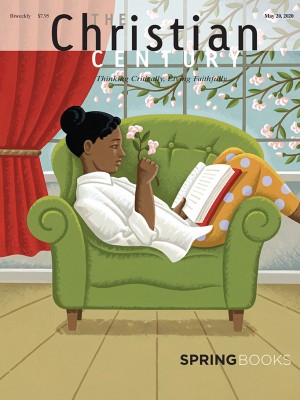Margaret Renkl’s stunning ability to see
It is hard to say what will enamor readers more, the bird calls or the familial ones.
Nested within the splendid, Audubon-like illustrations of her brother Billy, Margaret Renkl’s poetic voice opens the soul. What begins unassumingly as a wee bit of meditative reading slowly lodges itself in the heart, spleen, and unexplored tender places. Then abrupt brutality intervenes: a starling hangs itself from the wire of the birdfeeder, a wild-eyed donkey stamps to its death in a burning barn, menacing men threaten violence at the edge of a peanut field, a cherished hatchling succumbs to a puncture wound to the head. And then there is refuge. The intermingling of family stories and natural wonder—like the act of holding out for solstice in the darkness, or Easter in Lent, or simply tomorrow in today—provides a resting place.
Late Migrations tells the truth. Sometimes it excoriates. Sometimes it miraculously transforms. Must beauty come at such cost? Renkl’s answer is yes.
Born into an Alabama family with a strong history of blindness, Renkl has a stunning ability to see. The ferocious lives of women in her family ring with a clarity that is lacking in the old, blurry, off-centered photographs she discovers. Babies are born in chamber pots, blue pills and electroshock therapy steal precious memories, children gradually learn that their mothers’ tears may not be their fault, and an enormous deadly attic fan haunts dreams in a way that will be understood by anyone who inhabited that dark, dire corner in a childhood home. A previously unpublished essay by Renkl’s grandmother lives in these pages alongside transcriptions of interviews, preserving the elegant cadence of a southern vernacular.
Read our latest issue or browse back issues.
It is hard to say what will enamor readers more, the bird calls or the familial ones. Renkl wants to champion the bluejays and thwart the nest raiders while begrudgingly acquiescing that “the world is not large enough to contain so many cardinals.” Glimpses of freedom within natural constraint emerge in snow moons, migrating birds, and parents’ embarrassing veiled sexuality—their interlaced hands and their mysterious invocation of the “rhythm method that makes adults mad.”
Hers was a childhood house “with too many holes in it.” For this reason, Renkl’s wanderings through family history often leak into meditations on life and death in the natural world. She meanders through the life cycles of beloved humans and creatures at a similar pace. Ultimately, she shows, we cannot keep anything safe. She reminds us of what’s obvious but readily forgotten in the strain of daily tasks: the heart will inevitably break. When we care for our elders, she writes, “the end of caregiving isn’t freedom. The end of caregiving is grief.”
These brief essays are best parceled out in bits. When Renkl’s words are rushed, the rhythm gets old and loses its meditative quality. An intermittent swear word or an anecdote about a bullied child comes off as flat, morphing into the mechanical. Late Migrations asks a certain posture of readers, stretching thresholds for attentiveness.
For those who rapturously read the works of American gems like Annie Dillard, Edward Abbey, and Wendell Berry, Renkl’s reflections will join them conspiratorially. She highlights a celebrated Dillard essay on the eclipse and seeks to test its mystic hypothesis. Like other American naturalists, Renkl sees trees conspiring to induct her into their wonder. A sunset can break open our consciousness, she writes, for “only at twilight can an ordinary mortal walk in light and dark at once.”
Renkl hints that she knows the power of her small stories. She recalls that her sister’s deepest desire during their childhood nighttime ritual was for more of Renkl’s magical tales: “Her not asleep, Mama. Her just thinking of a story.”
Renkl’s images and anecdotes will return to readers at odd times. They’ll migrate, like the title suggests. Her saturated detail is the difference between the story of one dead Syrian boy washed onto shore that “keeps us awake at night with grief” and the millions of other refugees whose presence “seems more like a math problem.” She crafts new terms, like the “heavy bored” child in church who distracts herself by building universes out of her grandmother’s mottled skin. “Unleaving,” Renkl writes, should exist, for it could bring us to the time when the universe reveals itself to us as we listen for “the sound of trees giving themselves over to night.”
Late Migrations is a gift, and fortunate readers will steal away to a beloved nook or oasis to commune with its riches. Or they will simply dig into it, unprepared, like the mother with no gardening tools who determinedly pulls weeds until the ground blossoms. They might entrust it to fellow seekers they believe can handle its power. Consecrated, they’ll leave initiated into an art of observation lived beautifully in richness, connection, worry, and love.







